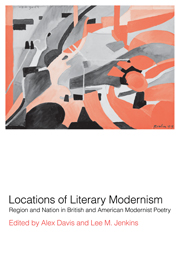Book contents
- Frontmatter
- Contents
- Notes on contributors
- Preface
- INTRODUCTION
- PART ONE OBSTINATE ISLES: THE ANGLO-CELTIC ARCHIPELAGO
- 1 MacDiarmid in Montrose
- 2 Bunting and Welsh
- 3 Antithesis of place in the poetry and life of David Jones
- 4 ‘Shut, too, in a tower of words’: Dylan Thomas' modernism
- 5 ‘Literally, for this’: metonymies of national identity in Edward Thomas, Yeats and Auden
- 6 Reactions from their burg: Irish modernist poets of the 1930s
- PART TWO AN AMERICAN PLACE
- Notes
- Index
2 - Bunting and Welsh
Published online by Cambridge University Press: 06 July 2010
- Frontmatter
- Contents
- Notes on contributors
- Preface
- INTRODUCTION
- PART ONE OBSTINATE ISLES: THE ANGLO-CELTIC ARCHIPELAGO
- 1 MacDiarmid in Montrose
- 2 Bunting and Welsh
- 3 Antithesis of place in the poetry and life of David Jones
- 4 ‘Shut, too, in a tower of words’: Dylan Thomas' modernism
- 5 ‘Literally, for this’: metonymies of national identity in Edward Thomas, Yeats and Auden
- 6 Reactions from their burg: Irish modernist poets of the 1930s
- PART TWO AN AMERICAN PLACE
- Notes
- Index
Summary
Basil Bunting seemed to delight in opposition: throughout his life he distanced himself from the literary and cultural authorities and establishments around him, preserving for himself a deliberately marginal voice which continues to resist easy classification. Like David Jones and Hugh MacDiarmid, he seems to stamp out a ground as an international modernist, with intense classical and local concerns. Like them, he drew deeply and consciously on the culture and languages of his homeplace, and like them his voice is often contrary to the ‘centre’ of British culture – a voice which resonates strongly in the emerging fragmented and marginalised cultures of Europe today, and which on occasion cries against the tenets of centralised economics.
One recurrent thread in Bunting's later work is the exploration of Old Welsh poetry, which he was at pains to identify as part of the cultural heritage of his homeplace in Northeast England, incorporating its poetic within his own aims. This chapter seeks to trace this concern as it runs through Bunting's later work, and to demonstrate its importance for him as a technical component, which links directly and practically to its importance as the cultural signifier of location as he fuses linguistic device with his robustly asserted concern for place.
As preparatory material it will be useful to offer a brief account of the Old Welsh poetries concerned, as they relate to Bunting's reading and writing.
- Type
- Chapter
- Information
- Locations of Literary ModernismRegion and Nation in British and American Modernist Poetry, pp. 57 - 66Publisher: Cambridge University PressPrint publication year: 2000

